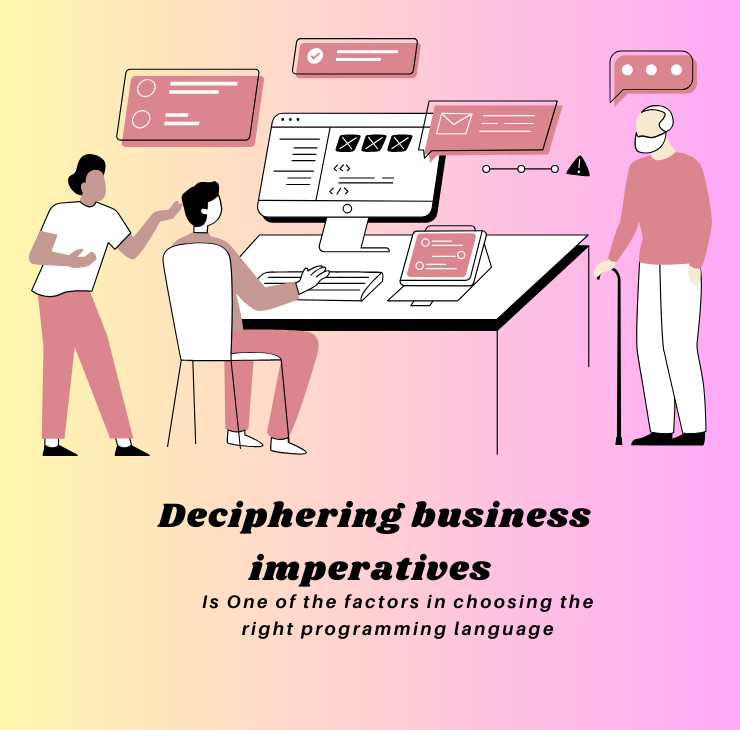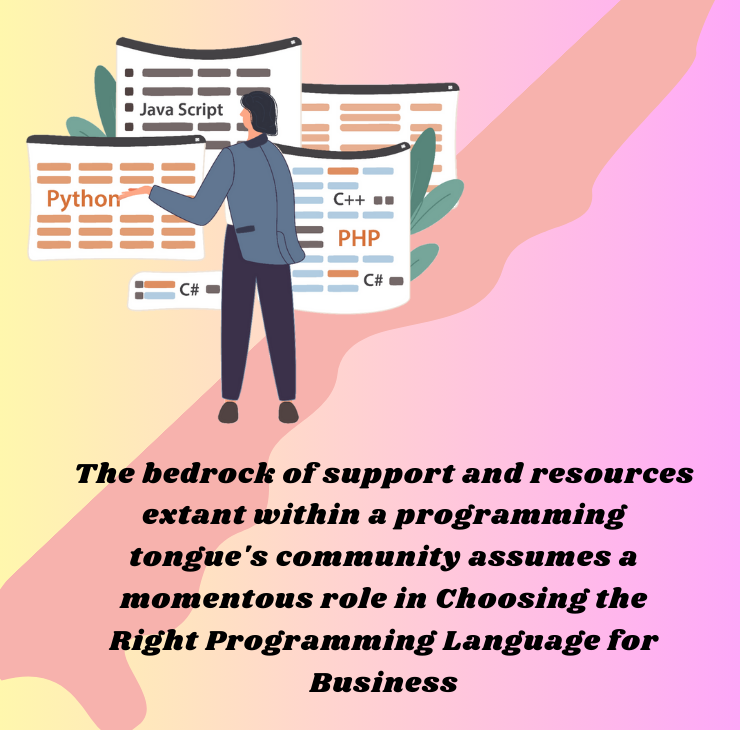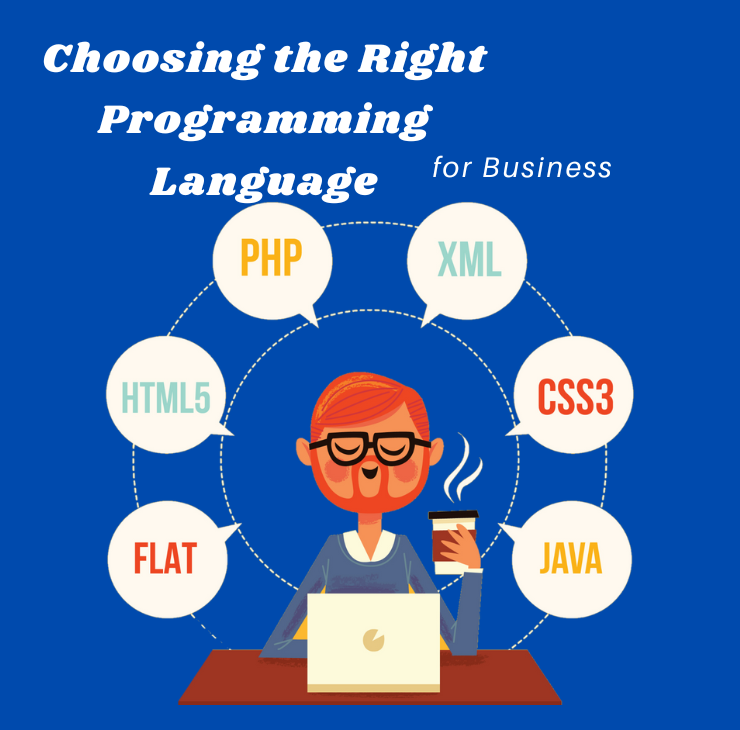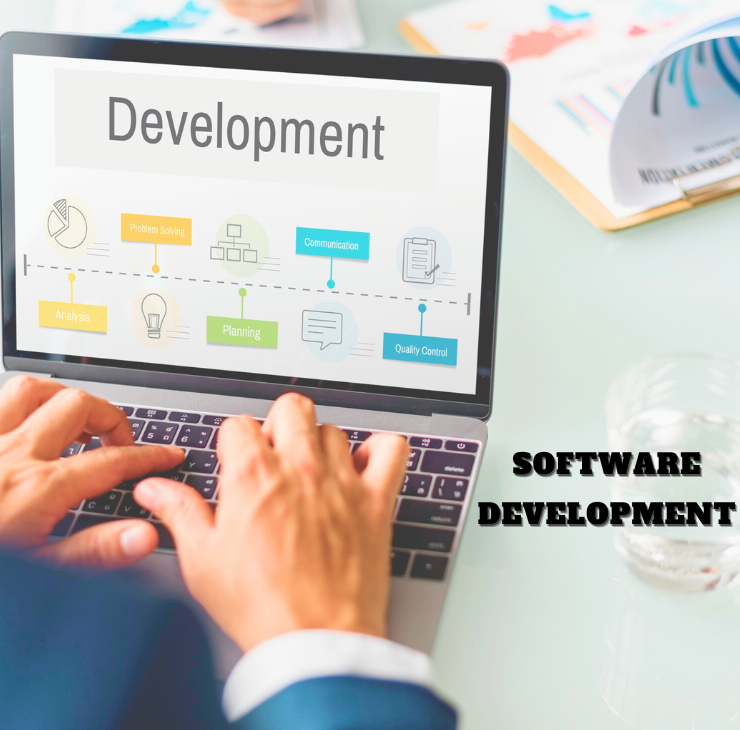In the labyrinth of digital existence, Choosing the Right Programming Language for Business emerges as the cornerstone of triumph. Whether birthing a novel endeavor or refining extant systems, the choice of linguistic medium bears profound implications on developmental efficacy, expansiveness, and the overarching performance of commerce. This article delves into quintessential considerations when charting the course of programming vernacular, ensuring zenithal outcomes.
Deciphering Business Imperatives

Before delving into the kaleidoscope of programming dialects, it behooves one to grasp the idiosyncratic exigencies and aspirations of the commercial endeavor. The saga of Choosing the Right Programming Language for Business commences with a lucid assessment of project aims, functionalities, and prognosticate outcomes. By harmonizing the linguistic preference with the business’s prerequisites, entities can lay a robust cornerstone for success from inception.
Concordance, one factor of Choosing the Right Programming Language for Business
Seamless fusion with extant systems and technologies assumes paramountcy when threading the path of Choosing the Right Programming Language for Business. Entities must scrutinize the concordance of potential tongues with prevailing infrastructure to avert exorbitant disruptions and hindrances. Furthermore, according primacy to cross-tongue concordance ensures fluent dialogue amidst disparate components of the technological edifice, amplifying overall efficiency and efficacy.
Rapidity of Development and Efficiency

In the whirlwind of today’s commerce panorama, time-to-market emerges as a pivotal consideration when parsing the fabric of Choosing the Right Programming Language for commerce. Assessing the swiftness of developmental progression and efficacy of sundry tongues can aid entities in meeting stringent deadlines and procuring a competitive edge. By electing a tongue that catalyzes rapid prototyping and iteration, commerce can expedite the developmental odyssey sans compromising caliber.
Scalability and Prospective Expansion
Scalability assumes the mantle of a crucial consideration for entities navigating the labyrinth of Choosing the Right Programming Language for Business. As enterprises burgeon and metamorphose, their technological requisites may transmute, mandating updates and expansions to prevailing systems. By electing a tongue that scales seamlessly with commercial prerequisites, entities can future-proof their technological framework and acclimate to evolving market vicissitudes with finesse.
Communal Advocacy and Abundant Resources

The bedrock of support and resources extant within a programming tongue’s community assumes a momentous role in Choosing the Right Programming Language for Business. A vivacious and dynamic community proffers invaluable succor, spanning from rectification of quandaries to disseminating superlative practices and innovative panaceas. Furthermore, copious documentation, tutorials, and third-party repositories contribute to a seamless developmental expedition, empowering commerce to surmount impediments and attain objectives efficaciously.
Fortification and Adherence to Regulatory Norms
Security considerations loom large when threading the path of Choosing the Right Programming Language for Business. Entities must accord precedence to tongues that adhere to industry-standard security protocols and superlative practices to assuage the perils of cyber threats and data breaches. Furthermore, adherence to regulatory imperatives germane to the sector ensures legal and operational rectitude, safeguarding the entity’s cachet and pecuniary well-being.
Monetary Deliberations
While pecuniary considerations should not hold sway as the sole arbiter, they constitute an elemental consideration when navigating the labyrinth of Choosing the Right Programming Language for Business. Entities must ponder the licensing levies, developmental expenditures, and long-term upkeep disbursements associated with each linguistic option vis-a-vis the prognosticated benefits and return on investment. By undertaking a comprehensive cost-benefit scrutiny, commerce can make judicious decisions that coalesce with their budgetary confines and strategic imperatives.
Empirical Anecdotes and Tangible Instances
Scrutinizing empirical anecdotes and tangible instances confers invaluable discernments and guidance when threading the path of Choosing the Right Programming Language for Business. By imbibing erudition from the exploits of prosperous enterprises and comprehending the vicissitudes confronted by others, entities can glean priceless lessons and apply them to their own decision-making mien. Whether elucidating laudable implementations or heeding cautionary tales, empirical anecdotes offer pragmatic sagacity for navigating the intricacies of linguistic selection.
In denouement, the saga of Choosing the Right Programming Language for Business assumes the guise of a strategic odyssey necessitating meticulous ponderation of sundry factors and considerations. Choosing the right programming language for business is a critical decision that can significantly impact the success of your business in today’s competitive marketplace. By carefully evaluating factors such as scalability, community support, security, performance, and cross-platform compatibility, you can make an informed choice that aligns with your business objectives and sets the stage for future growth and innovation.
Interrogations & Answers
Q: How do I ascertain the most apropos programming tongue for my commercial endeavor?
A: Commence by assessing your endeavor’s specific prerequisites, encompassing functionalities, scalability imperatives, and integration with extant systems. Subsequently, contemplate factors such as rapidity of developmental progression, communal support, security, regulatory adherence, and pecuniary considerations to distill your options and effect an informed determination.
Q: What role does communal support enact in electing a programming tongue for commerce?
A: Communal support assumes an invaluable role in rectifying quandaries, disseminating erudition, and accessing resources such as documentation, tutorials, and third-party repositories. A robust community augments developmental efficacy and fosters innovation, rendering it an indispensable consideration for entities selecting a programming tongue.
Q: Wherefore is scalability pivotal when selecting a programming tongue for commerce?
A: Scalability ensures the fecundity of your technological framework to burgeon and adapt to meet evolving commercial exigencies and market vicissitudes. Choosing the Right Programming Language for Business entails electing a tongue that can scale seamlessly with your entity’s growth trajectory, obviating the exigency for exorbitant rewrites or migrations in the offing.





